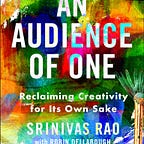If You Want to Build an Audience, Focus on Mastery Instead of Metrics
A few days ago, I interviewed Danielle Laporte for Creative Live’s podcasting week. My host Drew asked me what advice I would give someone who is just starting out. My advice for anyone starting out, whether that be as a podcast host, a writer, or any other kind of creative was to commit to mastery over metrics. Far too often people prioritize metrics over mastery.
- They value the number of downloads on a podcast over the quality of a conversation
- They value traffic to a blog post over the quality of the writing
Anyone can game the system when it comes to metrics. They can spend a ton of money and drive traffic to a shitty blog post or lousy podcast. They can hire a company to buy thousands of copies of their book and make a best-seller list. But gaming the system is not a sustainable long-term strategy to build an audience for your work. If you commit to mastery, eventually the metrics will improve. But if you commit solely to metrics, it’s unlikely you’ll ever reach the point of mastery:
- Constantly checking the traffic to your website won’t cause it to go up. Writing something worth reading will.
- Obsessively looking at your podcast downloads won’t cause them to go up. Producing an amazing episode will.
Metrics have their place. But, when we focus obsessively on metrics, we put a significant amount of our energy into something we can’t control. When we commit to mastery that same energy gets redirected to what we can control: our effort.
What You Control VS. What you Don’t
“In the end you have greater control over your actions than you do your results. Your results are created by your actions.”– Brian Moran, The 12 Week Year
You can’t predict how many page views or how much traffic one article is going to get. But you can control whether or not you write 1000 words a day. You can control how many articles you choose to publish. By focusing on the things you control, you tap into the profound power of consistency, experience visible progress, and build momentum. This more than anything is what it means to create for an audience of one.
Write down a goal you have. Then write down all the things about the goal that you control and all the ones you don’t. Then take action on the things that you control.
Attention Doesn’t Equate to Value
Because we’ve quantified nearly every aspect of our lives and made it nearly effortless to capture a person’s attention with selfies, tweets, and status updates, people overvalue metrics and undervalue mastery.
Most people who have become masters of their craft did so long before social media ever existed and before they could quantify their value in artificial metrics:
- Annie Leibowitz preceded Instagram.
- U2 preceded Spotify
- Stephen King preceded websites like Medium
Just because you’ve gained somebody’s attention for a small fraction of their day, it doesn’t necessarily mean you’ve created something of value.
The Long Game
Very few people commit to mastery because it requires playing the long game. It takes years of deep work and deliberate practice.
Why spend ten years becoming so good they can’t ignore you, when you can spend 20 seconds uploading a picture to Instagram or composing a tweet to be so average that they pay attention to you for a fraction of a second.
The beauty of the long game is that there’s less competition because the overwhelming majority of people (millions) are playing the short game:
- There are far fewer people attempting to write books than there are people composing tweets.
- There are far fewer people attempting to make better art than people who are looking for more tactics
People who play the short game might be relevant for a moment in time. But people who play the long game are more likely to create something timeless.
Commitment to Mastery Leads to Higher Quality Products and Perennial Sellers
“It’s much better to first make a product a small number of users love than a product that a large number of users like. Even though the total amount of positive feeling is the same, it’s much easier to get more users than to go from like to love.” — Sam Altman
When I started the Unmistakable Creative in 2009, I thought that I would interview famous people, they would tweet about my interviews with their millions of followers, and every interview would go viral. I realized how misinformed that was within two months. It became clear that our listeners were the ones who were going to cause our show to grow. Over the last ten years, our listeners have shared our show with friends, family members, and co-workers. The small group of people who loved our work helped us reach a much larger group of people.
The paradox of prioritizing mastery over metrics is that it makes what you’ve created much more scalable. If your product (book, podcast, app, etc.) sucks, no amount of “growth hacking” will cause it to go from lingering in obscurity to becoming a unicorn.
When you commit to mastery, you increase the likelihood of producing something with emotional resonance. If it has emotional resonance, it will continue to spread without hacks and tactics. It will become what Ryan Holiday calls a Perennial Seller. But it could take years before it does.
When you focus on mastery, the metrics will eventually move in a positive direction. It’s an inevitable byproduct of being so good they can’t ignore you.
Have you lost touch with your creative capacity?
I’ve put together a list of interviews with artists, authors, and entrepreneurs to help you regain your creative confidence and make your ideas happen. Just click here.
